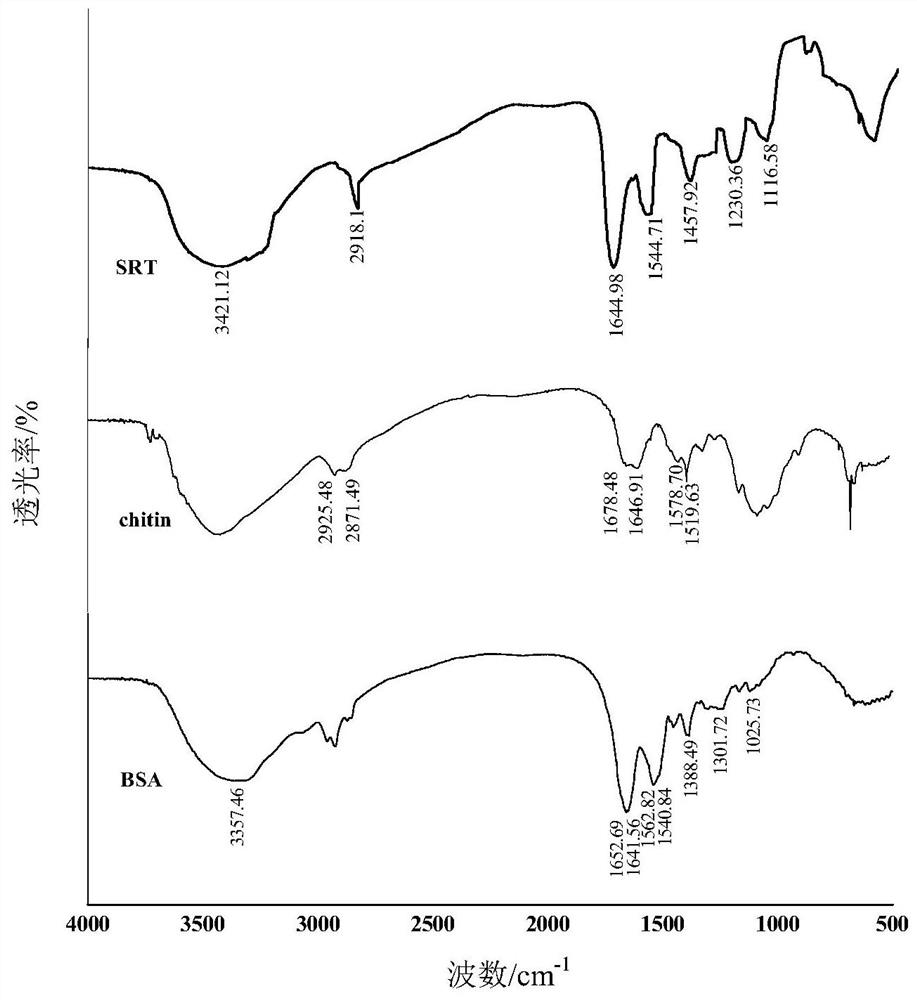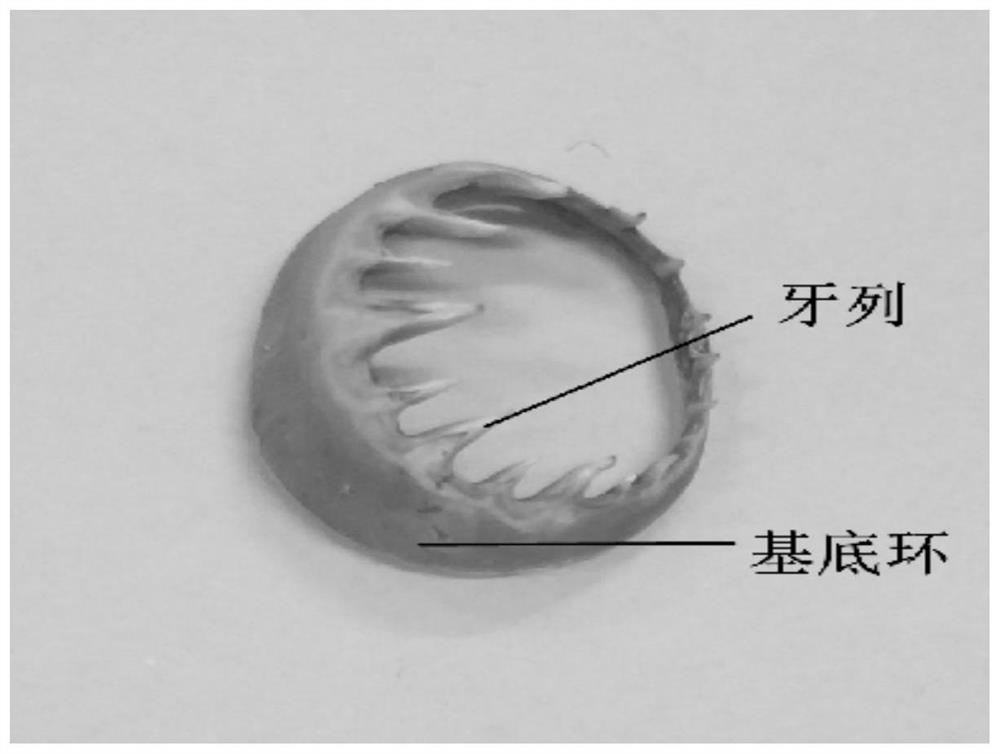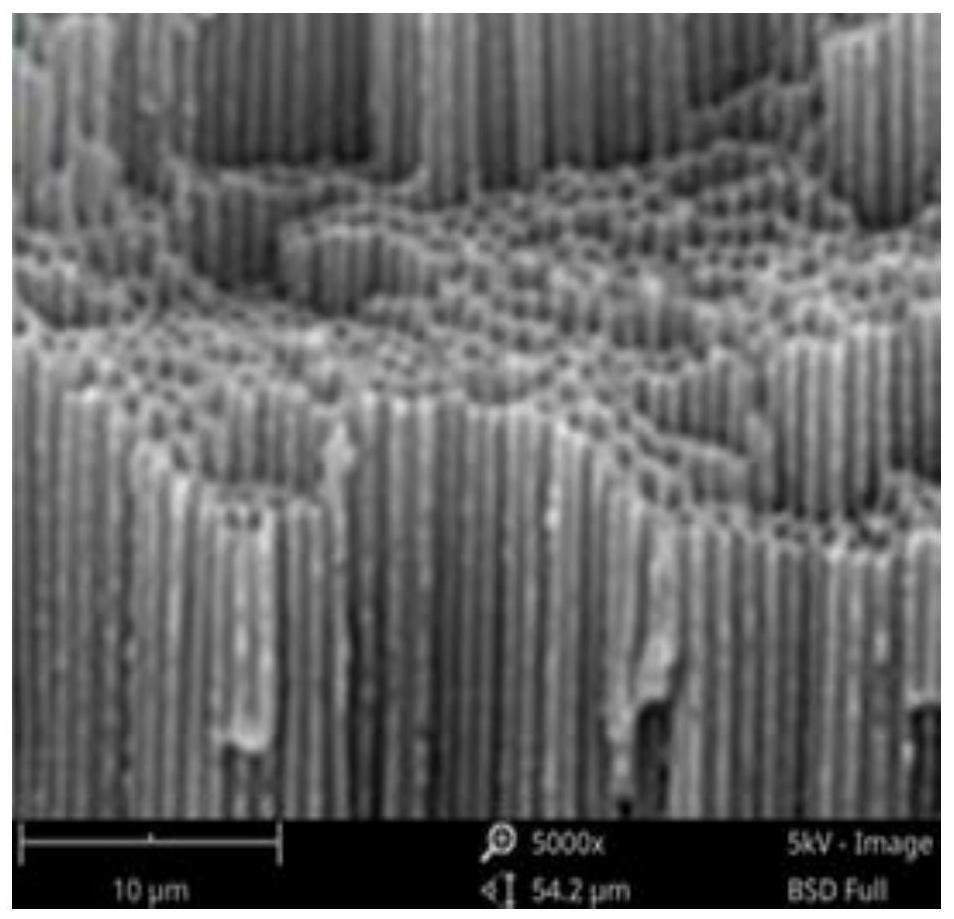A method of breaking away from squid sucker ring teeth
A technology of ring teeth and suction cups, which is applied in the processing and slaughtering of fish and cephalopods, can solve the problems of lack of effective utilization methods, high degree of occlusion between suction cups and ring teeth, and difficulty in detachment, so as to achieve detoxification The effect of low cost, guaranteed quality, and improved tooth removal rate
- Summary
- Abstract
- Description
- Claims
- Application Information
AI Technical Summary
Problems solved by technology
Method used
Image
Examples
Embodiment 1
[0029] Example 1: Research on sucker ring teeth of Peruvian squid
[0030] Raw materials: Frozen Peruvian squid silk, purchased from Zhoushan Haili Oceanic Fishery Co., Ltd.
[0031] Reagents: standard bovine serum albumin, Sigma Company of the United States; chitin, Shanghai Sangong Bioengineering Co., Ltd.; other hydrochloric acid and sodium hydroxide reagents were of analytical grade, Sinopharm Chemical Reagent Co., Ltd.
[0032] Instruments and equipment: Nicolet 6700 infrared spectrometer, Thermo Nicolet Company of the United States; HH-4 electric heating constant temperature water bath, Changzhou Guohua Electric Co., Ltd.; LGJ-10 freeze dryer, Beijing Songyuan Huaxing Technology Development Co., Ltd.; GZX-9240MBE electric heating Blast drying oven, Shanghai Boxun Industrial Co., Ltd.; Phenom desktop scanning microscope, Funa Scientific Instruments Shanghai Co., Ltd.; DFT-250 high-speed universal pulverizer, Shanghai Chuding Analytical Instrument Co., Ltd.; 200F 3 differe...
Embodiment 2
[0055] A method for breaking away from squid sucker ring teeth, comprising the following steps:
[0056] (1) Pretreatment: thaw the frozen squid, wash and drain, and set aside.
[0057] (2) Osmosis treatment: Under vacuum conditions, the pretreated squid must be placed in the infiltration solution, soaked at 4°C for 30 minutes, and the ratio of solid to liquid is 1:2. Wherein, the above-mentioned permeate is a compound saline solution in which sodium pyrophosphate, sodium tripolyphosphate, sodium hexametaphosphate and sodium chloride are dissolved, and sodium pyrophosphate, sodium tripolyphosphate, sodium hexametaphosphate and The mass concentration of sodium chloride is respectively: 40%, 35%, 5%, 5%.
[0058] (3) Pre-separation: Place the pretreated squid whiskers on a heating plate, then place an extrusion plate on the squid whiskers, heat at 60°C for 4 seconds, and squeeze the squid whiskers with the squeeze plate during the heating process. It can be seen from Example 1...
Embodiment 3
[0062] A method for breaking away from squid sucker ring teeth, comprising the following steps:
[0063] (1) Pretreatment: thaw the frozen squid, wash and drain, and set aside.
[0064] (2) Osmosis treatment: Under vacuum conditions, the pretreated squid must be placed in the infiltration solution, soaked at 7°C for 45 minutes, and the ratio of solid to liquid is 1:3. Wherein, the above-mentioned permeate is a compound saline solution in which sodium pyrophosphate, sodium tripolyphosphate, sodium hexametaphosphate and sodium chloride are dissolved, and sodium pyrophosphate, sodium tripolyphosphate, sodium hexametaphosphate and The mass concentration of sodium chloride is respectively: 42%, 37%, 7%, 7%.
[0065] (3) Pre-separation: place the pretreated squid whiskers on a heating plate, then place an extrusion plate on the squid whiskers, heat at 80°C for 3 seconds, and squeeze the squid whiskers with the squeeze plate during the heating process. It can be seen from Example 1...
PUM
| Property | Measurement | Unit |
|---|---|---|
| concentration | aaaaa | aaaaa |
Abstract
Description
Claims
Application Information
 Login to View More
Login to View More - R&D
- Intellectual Property
- Life Sciences
- Materials
- Tech Scout
- Unparalleled Data Quality
- Higher Quality Content
- 60% Fewer Hallucinations
Browse by: Latest US Patents, China's latest patents, Technical Efficacy Thesaurus, Application Domain, Technology Topic, Popular Technical Reports.
© 2025 PatSnap. All rights reserved.Legal|Privacy policy|Modern Slavery Act Transparency Statement|Sitemap|About US| Contact US: help@patsnap.com



